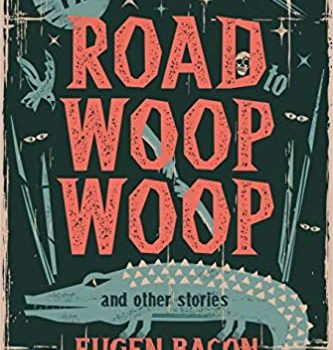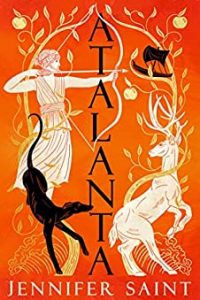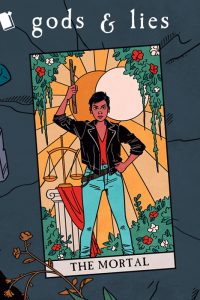Ian Mond Reviews The Road to Woop Woop and Other Stories by Eugen Bacon
 The Road to Woop Woop and Other Stories, Eugen Bacon (Meerkat Press 978-1-94615-431-6, $16.95, 192 pages) December 2020.
The Road to Woop Woop and Other Stories, Eugen Bacon (Meerkat Press 978-1-94615-431-6, $16.95, 192 pages) December 2020.
The 24 stories that make up Eugen Bacon’s new collection The Road to Woop Woop and Other Stories run the gamut in terms of tone, genre, and structure. There are experimental, modernist pieces reminiscent of the New Wave, namely “A Good Ball”, “The Enduring”, or “A Man Full of Shadows”; playful, self-aware tales such as “The Animal I Am” and “Wolfmother”; and reflective, melancholy stories like “Swimming With Daddy” and “The One Who Sees”. As Seb Doubinsky rightly points out in his Foreword, what ties the collection together is Bacon’s distinctive voice (which Doubinsky compares to free jazz) that nimbly shifts between the lush, the opaque, and the colloquial (Bacon, like myself, is fond of Aussie slang). This is exemplified in the title story, which opens the collection, about a couple who take a road-trip to Woop Woop (the middle of nowhere) to mend a frayed relationship. Bacon cleverly blends the isolated Australian setting with vibrant, discordant prose and an injection of the uncanny – our narrator’s partner unexpectedly starts losing body parts – to poignantly reflect a couple drifting apart. Unravelling relationships is a common theme across several of the stories in the collection, including “A Case of Seeing”, “Playback, Jury of the Heart”, “A Pining”, and “He Refuses To Name It”. In the latter, our protagonist, Calder, discovers that not only is his ex-girlfriend dead, but he is now the father and primary carer for a new-born child. Calder, however, begins to question his sanity when he notices that he can never recall the child’s face and finds himself in possession of baby supplies he has no memory of purchasing. This creeping weirdness leads to a genuinely moving climax when Calder, who refers to the baby as an “it,” connects with the child and acknowledges her gender. “His heart swelled with sudden affection. Titian curls on her head. She looked like a Zoe. He created her as she smiled, this time in her dream.”
The pieces I enjoyed the most marry together Bacon’s jazzy prose with a rowdy imagination and irreverent sense of humour. In “Being Marcus” an immortal Brutus (yes, of the “et, tu Brute?” fame) is working as an instructor at a fitness studio where he teaches boxing to gum-popping brunettes with manicured nails, while recognising that he is “cursed to forever be a fragment of the man he once was, a shadow of the hero he loved.” Then there’s “A Maji Maji Chronicle” which introduces us to the time-travelling duo of Zhorr, the grand magician of the Diaspora, and his son Pickle. Their adventure to German East Africa in the early part of the 19th century – where Zhorr intends to teach the boy about the futility of fiddling with time – isn’t just spit-your-drink funny (especially the bit with the bazooka) – but it’s also a refreshing and thought-provoking take on a familiar trope. But the story that still elicits a chuckle days after reading it is “Dying”, which tells the tale of Bluey (the affectionate Australian sobriquet given to blokes with red hair) who comes to realise that he cannot die. Unlike Groundhog Day or the recent Netflix series Russian Doll, Bluey doesn’t repeat the same 24 hours, but instead finds himself in bed, the next morning, very much alive. I found Bluey’s many and varied deaths, together with the banter he shares with his gun-loving workmate Joffa, side-splittingly funny (though readers outside of Australia may need a dictionary for all the lovely slang).
The best story in The Road to Woop Woop and Other Stories is neither comical nor features a speculative element; instead, “Scars of Grief” is an experimental tale inspired by the infamous phone-hacking scandal perpetrated by “News of the World” reporters back in 2005. The narrative alternates between an unnamed author looking to provide a fictional account of the families harmed by the scandal, and excerpts from the author’s manuscript involving two families whose phones were tapped after the brutal murder of their daughters. I found Bacon’s meta-fictional approach exhilarating because it allowed her to explore the difficulties and challenges of writing, while in the same breath presenting us with a harrowing portrayal of two couples dealing with their anguish and grief in the public sphere.
While I didn’t love all the stories that appear in The Road to Woop Woop and Other Stories, Bacon’s passion for language and her willingness to play with the short-story form, to never settle on one type of narrative or genre, makes this an exciting collection that’s well worth picking up.
This review and more like it in the November 2020 issue of Locus.
 While you are here, please take a moment to support Locus with a one-time or recurring donation. We rely on reader donations to keep the magazine and site going, and would like to keep the site paywall free, but WE NEED YOUR FINANCIAL SUPPORT to continue quality coverage of the science fiction and fantasy field.
While you are here, please take a moment to support Locus with a one-time or recurring donation. We rely on reader donations to keep the magazine and site going, and would like to keep the site paywall free, but WE NEED YOUR FINANCIAL SUPPORT to continue quality coverage of the science fiction and fantasy field.
©Locus Magazine. Copyrighted material may not be republished without permission of LSFF.








